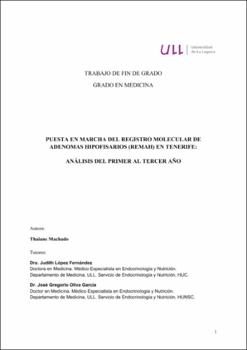Puesta en marcha del registro molecular de adenomas hipofisarios (REMAH) en Tenerife: análisis del primer al tercer año.
Autor
Machado, ThaianeFecha
2020Resumen
Los adenomas hipofisarios son tumores poco frecuentes con un diagnóstico complejo,
requiriendo un enfoque multidisciplinar, cuya heterogeneidad y baja incidencia dificultan
estudios a gran escala. El proyecto REMAH (Registro Molecular de Adenomas Hipofisarios)
es un proyecto de la Sociedad Española de Endocrinología y Nutrición (SEEN) nacional y
multicéntrico, que pretende elaborar una base de datos nacional de adenomas hipofisarios
recoger de forma prospectiva tanto los datos de su comportamiento clínico como los datos
resultantes de su estudio molecular. El objetivo a corto plazo trata de registrar de forma
individual las características clínico-patológicas de cada adenoma hipofisario y la expresión
de receptores de cada tumor. Esto nos permitirá definir las características clínicas de los
adenomas hipofisarios en cada una de las áreas geográficas que participan en el proyecto y
explorar alternativas terapéuticas en casos de falta de respuesta a los fármacos habituales. El
objetivo principal, a largo plazo y tras obtener un gran tamaño muestral, es profundizar en el
conocimiento de las alteraciones moleculares presentes en los adenomas hipofisarios
humanos, lo que podría permitir comprender mejor esta patología, predecir la agresividad y
progresión tumoral, seleccionar de forma más eficiente el tratamiento farmacológico que
precisen y definir nuevas dianas terapéuticas.
En el año 2014 un grupo de tres estudiantes de grado de Medicina nos incorporamos a este
proyecto, bajo la tutela de los Dres. Judith López Fernández y José Gregorio Oliva García y
la Licenciada en Biología Mª Teresa Arce, para colaborar en el inicio del REMAH en
Tenerife y la coordinación del proyecto en el Hospital Universitario de Canarias (HUC) y en
el Hospital Universitario Nuestra Señora de Candelaria (HUNSC).
Nuestro objetivo ha sido recoger todas las variables clínicas, analíticas, radiológicas y
anatomopatológicas de los pacientes a estudio y registrarlas en la base de datos REMAH,
además de establecer un circuito para la correcta obtención, almacenamiento y envío de una
muestra tumoral al Instituto Maimónides de Investigación Biomédica (IMIBIC) de la
Universidad de Córdoba, nuestro nodo para la realización del estudio molecular.
Finalmente, en el año 2018 colaboramos en la preparación de la incorporación al proyecto
REMAH-TF del siguiente grupo de estudiantes de grado para asegurar su eficaz
continuación.
En la presente memoria se analizan los datos clínicos del primer al tercer año del proyecto. Pituitary adenomas are rare tumors with a complex diagnosis, requiring a multidisciplinary
approach, whose heterogeneity and low incidence make large-scale studies difficult. The
REMAH project (Molecular Registry of Pituitary Adenomas) is a national and multicenter
project by the Spanish Society of Endocrinology and Nutrition (SEEN), which aims to
develop a national database of pituitary adenomas to prospectively collect data on their
clinical behavior and the data resulting from their molecular analysis. The short-term
objective is to collect the clinicopathological characteristics of each pituitary adenoma
individually and the expression of receptors for each tumor. This will allow us to define the
clinical characteristics of pituitary adenomas in each of the geographic areas participating in
the project and to explore therapeutic alternatives in cases of non-response to the usual
treatments. The main objective, in the long term and after obtaining a large sample size, is to
deepen the knowledge of the molecular alterations present in human pituitary adenomas,
which could allow us to better understand the pathological aspects of pituitary adenomas,
predict tumor aggressiveness and progression, improve the treatment selection process and
define new therapeutic targets.
In 2014, a group of three medical students joined this project, under the tutelage of Drs.
Judith López Fernández and José Gregorio Oliva García and the Bachelor of Biology Mª
Teresa Arce, to collaborate in the starting of the REMAH project in Tenerife and the
coordination of the project at the Hospital Universitario de Canarias (HUC) and the Hospital
Universitario Nuestra Señora de Candelaria (HUNSC).
Our objective has been to collect all the clinical, analytical, radiological and pathological
variables of the patients under study and register them in the REMAH database, in addition to
establishing a circuit for the correct collection, storage and dispatch of a tumor sample to the
Maimonides Institute of Biomedical Research (IMIBIC) of the University of Córdoba for
conducting the molecular study.
Finally, in 2018 we collaborated in the preparation for the next group of undergraduate
students to join the REMAH-TF project to ensure its effective continuation.
This report analyzes clinical data from the first to the third year of the project.





